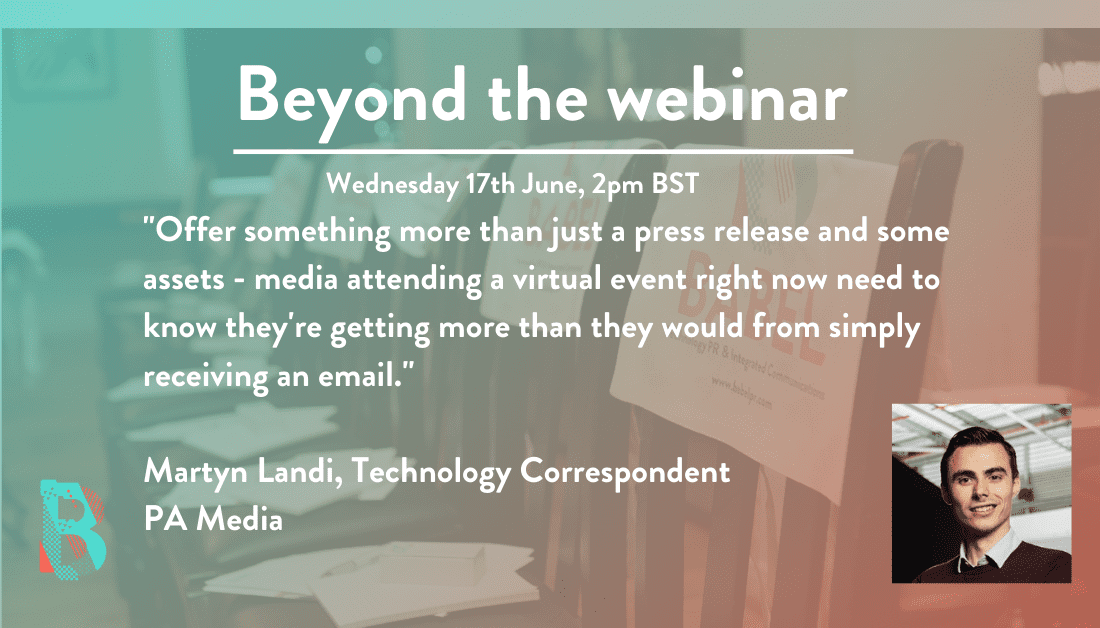
How to host a virtual event: advice from a PA journalist
Mobile World Congress was the first major tech sector event to be cancelled due to COVID-19 back in February. At the time, many businesses wondered how they’d manage to go ahead with product launches, gain media coverage, network with new and existing customers, and recoup their losses. The idea of hundreds of hours of conferences and discussions moving from a physical to a virtual setting wasn’t too well received. Plus, how could you recreate the atmosphere of an after-show drinks party online? Without a flashy stand and physical products to show, how could you impress prospects and explain complex tech to new journalist contacts?
Over the past few months, the online space been the only setting for events, impacting a whole swathe of industries (and marketing departments). While hosting virtual events has meant money saved for some brands (especially when compared to the cost of an exhibition stand at a major trade show!), it has not always delivered value. Education, relationship building, advice, or something more tangible – events need to deliver for both attendees and businesses. And it’s this that many businesses are struggling with.
Babel hopes to change all that. We’re hosting a panel discussion next Wednesday, 17th June, offering guidance on how to host your own virtual event, and drive engagement with customers, prospects and the media. Attendees will be able to submit questions to our panel, which includes a number of journalists and business leaders. Among these is Martyn Landi, Technology Correspondent at PA Media (formerly Press Association), a leading provider of multimedia content and services. A company with historic roots, PA Media has adapted its services and content to suit the rapidly changing media landscape, and the demands and business objectives of news readers and news agencies alike. So, who better to offer words of advice on the next phase of that evolution?
Ahead of our event next week Landi offers some top tips on hosting events in the ‘new normal’:
- Pick a platform and a set-up and stick to it. Virtual events and briefings quickly come unstuck when organisation goes out the window and everyone unmutes at the same time to try and ask a question.
- Offer something more than just a press release and some assets. Media attending a virtual event right now need to know they’re getting more than they would from simply receiving an email.
- Virtual events don’t need to last as long as real ones. It’s OK for your event to not last the same four hours your real one was going to, and trying to make up time with filler can quickly make things awkward. No one wants to stare at a Zoom call for several hours. Journalists on a deadline in particular.
- Take advantage of the circumstances. Maybe that perfect speaker you had planned couldn’t travel for the physical event, but technology will hopefully mean they can now get involved long-distance and not be the only one using video conferencing.
- Don’t make it too complicated. Event fatigue sets in a lot quicker when you’re not in new surroundings to keep you engaged. Make everything short, sharp and to the point.
- Screen-sharing should be a bonus, not a requirement. Not every virtual briefing needs to involve a detailed PowerPoint presentation. Sometimes, it’s much more engaging for everyone involved if you can simply see the person talking and respond to that.
Landi will appear on our panel alongside Zoe Kleinman, Technology Reporter for the BBC; Babel’s Managing Director Jenny Mowat; and Derek Weeks, VP of Sonatype and Co-Founder of All Day DevOps, one of the world’s largest virtual events, which last year attracted over 36,000 technology professionals. Overseeing the discussion will be Babel Associate Director, Katie Finn.
We’ve collectively witnessed decades of change in the tech sector, and look forward to discussing how this most recent shift has impacted business strategies and marketing budgets. Arguably, it’s brands in the tech industry that should be the best-placed to move from physical to virtual event hosting – after all, it’s our internet connections, laptops, HD cameras, collaboration tools, apps, and gig economy services that are making many virtual events possible. But it’s easy to forget that this is an industry that has relied for so many years on physical conferences, trade shows, and product launches.
So, tune in on Wednesday, hear from our panel and join the discussion. Register for free to secure your spot.





